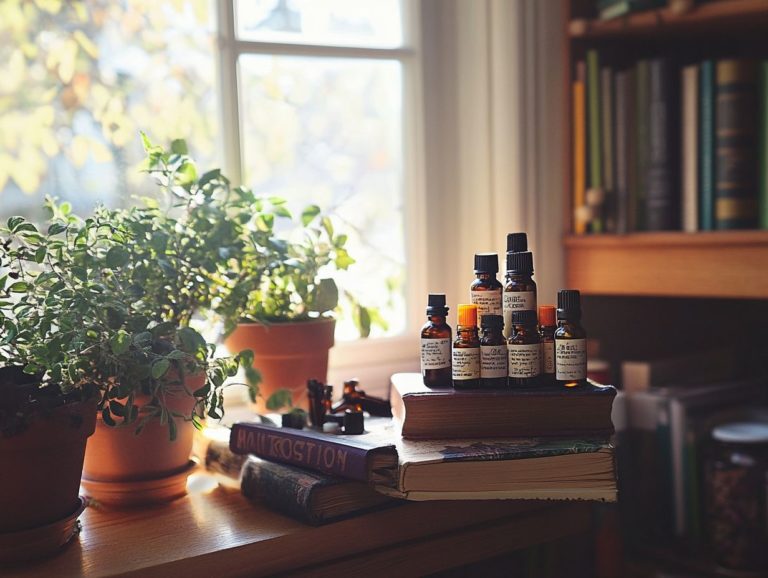5 Homeopathic Remedies for Painful Periods
Experiencing painful periods can be a challenging and often disruptive aspect of your life. While traditional treatments provide some relief, homeopathy offers a holistic approach that addresses the underlying causes of your discomfort.
This exploration delves into five effective homeopathic remedies Magnesium, Pulsatilla, Chamomilla, Belladonna, and Sepia that can help ease your menstrual pain.
You ll discover the principles of homeopathy and how it can effectively alleviate your discomfort. The article also covers potential side effects and practical tips for seamlessly integrating these remedies into your daily routine.
Knowing when to seek medical attention is crucial for your menstrual health, providing you with a comprehensive guide to managing your menstrual health effectively.
Contents
Key Takeaways:

Magnesium can help alleviate painful periods by relaxing muscles and reducing cramping.
Pulsatilla is a homeopathic remedy that can regulate menstrual cycles and ease mood swings during periods.
Chamomilla can be used for period pain relief and to reduce irritability and anger associated with painful periods.
1. Magnesium
Magnesium plays a crucial role in alleviating painful menstruation, offering a natural remedy for menstrual cramps that you might experience during your cycles. This essential mineral aids in relaxing muscles and reducing the severity of period pain, making it a significant option if you’re exploring alternatives to conventional treatments.
Research indicates that magnesium can significantly decrease menstrual pain by lowering prostaglandin levels hormones that cause cramps. Experts recommend a daily dosage of around 300-400 mg for optimal effects, though your individual needs may vary.
It’s also worth noting how magnesium interacts with other vital minerals, such as calcium and potassium; together, they can enhance its benefits. One study published in the journal ‘Pain Research and Management’ found that women who supplemented with magnesium experienced notable reductions in pain intensity.
Adding magnesium to your diet can ease discomfort and improve your menstrual health.
2. Pulsatilla
Pulsatilla is a renowned homeopathic remedy that can effectively tackle painful menstruation, offering relief for those enduring menstrual cramps. It s especially advantageous for women who experience emotional symptoms alongside their cramps, providing a holistic approach to managing period pain.
This remedy zeroes in on specific symptoms like excessive mood swings, irritability, and the physical discomfort of cramping pains, which often feel better with movement.
In the realm of homeopathy, Pulsatilla works by stimulating your body s own healing processes, promoting balance and alleviating the discomforts associated with your menstrual cycle. Typically, dosages involve lower potencies, such as 6C or 30C, taken as needed usually around three times a day.
Many women have found success with Pulsatilla; one noted that after just a few doses, her debilitating cramps lessened significantly, allowing her to get back to her daily activities without the usual hindrance. Another experienced improved emotional stability, transforming her menstrual experience into something much more manageable.
3. Chamomilla

Chamomilla stands out as a remarkable homeopathic remedy for painful menstruation, celebrated for its soothing properties that effectively alleviate menstrual cramps. This natural solution not only targets physical discomfort but also nurtures emotional balance, making it an ideal choice for women navigating both pain and irritability during their periods.
You ll find that Chamomilla can be taken in various forms, such as tinctures, teas, or pellets, offering you the flexibility to choose what suits your preference best.
While Chamomilla is generally safe for most individuals, it’s wise to exercise caution if you have allergies to plants in the daisy family. Consulting a healthcare professional is advisable, especially if you are pregnant or breastfeeding.
By incorporating Chamomilla into your wellness routine, you can experience not just relief from painful menstruation but also a calmer and more balanced emotional state throughout your cycle.
Try these remedies and share your experiences with others to foster a supportive community around menstrual health!
4. Belladonna
Belladonna is a highly regarded homeopathic remedy for dysmenorrhea. It’s especially effective for intense menstrual cramps.
This remedy swiftly targets acute pain, providing quick relief when you need it most during those challenging moments of menstrual discomfort.
Thanks to its distinctive pharmacological properties, belladonna functions as an antispasmodic, promoting essential muscle relaxation that helps ease the tension linked to menstrual pain.
Beyond its muscle-relaxing capabilities, it also possesses analgesic properties that can effectively dull the sensation of pain, providing you with a comprehensive approach to managing dysmenorrhea.
Use this remedy wisely to avoid side effects such as dry mouth, dizziness, or blurred vision. Seeking advice from a healthcare professional can offer invaluable insights into the appropriate use tailored to your specific needs.
5. Sepia
Sepia es un remedio homeop tico esencial para la dismenorrea, particularmente ventajoso para ti si est s lidiando con calambres menstruales acompa ados de fatiga o agitaci n emocional. Addresses both the physical and emotional aspects del dolor menstrual, lo que lo convierte en una opci n hol stica para manejar esos s ntomas desafiantes.
Este remedio es especialmente beneficioso si a menudo te sientes irritable, ap tica o incluso abrumada durante tu ciclo menstrual; su enfoque equilibrado puede ofrecerte el alivio que buscas. S ntomas como dolor en la parte baja de la espalda, hinchaz n y una tendencia a sentir fr o tambi n podr an mejorar con sepia, proporcionando una soluci n integral para muchos.
When combined with remedies like Pulsatilla or Natrum Muriaticum, the effectiveness can be amplified, adapting the treatment to your specific symptoms. Don t wait to find relief! Take sepia 30C three times a day before your period starts for the best results.
What Is Homeopathy and How Does It Work?

Homeopathy presents a holistic approach to medicine, using very small amounts of natural substances to stimulate your body s innate healing processes. This makes it a valuable option for addressing various conditions, including dysmenorrhea and menstrual cramps.
By focusing on your specific symptoms and the underlying causes of painful menstruation, homeopathy offers personalized remedies tailored to your unique needs.
The practice dates back to the late 18th century, founded by Samuel Hahnemann, a German physician who sought gentler alternatives to the harsh treatments prevalent in his time. At the core of this philosophy lies the principle of “like cures like,” suggesting that a substance causing symptoms in a healthy individual may effectively treat similar symptoms in someone unwell.
When considering homeopathy for menstrual pain, practitioners take a careful look at various factors such as the intensity, timing, and accompanying symptoms to determine the most suitable remedy for you. This individualized approach not only alleviates cramping but also addresses emotional and physical imbalances, promoting overall well-being throughout your menstrual cycle.
What Are the Key Principles of Homeopathy?
The key principles of homeopathy center on individualization, minimalism, and the Law of Similars. This means that treatments should be uniquely tailored to your specific symptoms and constitution, ensuring a more effective response to conditions like dysmenorrhea.
These principles acknowledge that each person experiences menstrual cramps differently, shaped by factors such as emotional state, lifestyle, and overall health. For example, you might feel severe pain coupled with anxiety, while someone else may contend with mild discomfort alongside fatigue.
A skilled homeopath carefully assesses your unique needs, addressing not just the physical symptoms but also your emotional responses. By utilizing the Law of Similars, they might prescribe remedies like Chamomilla if irritability and pain are significant for you, or Pulsatilla if you experience fluctuating moods.
This thoughtful and personalized approach highlights the importance of tailored care in alleviating menstrual discomfort and tackling other health challenges you may face.
How Can Homeopathy Help with Painful Periods?
Homeopathy offers a variety of remedies that can significantly alleviate the symptoms of painful periods (dysmenorrhea) by addressing both physical discomfort and emotional strain.
Among the most notable remedies is Chamomilla, recommended for those experiencing intense irritability and pain. Pulsatilla caters to individuals whose symptoms fluctuate with their emotional state.
Research suggests that customizing homeopathic treatment can lead to remarkable improvements. It’s crucial to match the remedy to your unique symptom profile.
Numerous case studies highlight women who discovered relief through homeopathy after exploring various treatments. This underscores not only a reduction in pain but also an overall enhancement in their quality of life.
Testimonials validate these experiences, with many expressing gratitude for a more holistic approach that respects their body’s needs.
What Are the Possible Side Effects of Homeopathic Remedies?

While homeopathy is generally seen as a safe option, be aware of possible side effects linked to certain remedies when addressing painful periods.
You may experience mild reactions such as headaches, nausea, or a temporary flare-up of symptoms after beginning a remedy. Though rare, more severe side effects can occur, potentially leading to increased discomfort.
Some specific homeopathic remedies may have contraindications, especially if you have allergies or pre-existing health conditions. Always consult a qualified homeopath and share your complete health history to minimize risks.
If any persistent or unusual symptoms arise, reach out to a healthcare professional to ensure safe and effective treatment.
How Can One Incorporate Homeopathy into Daily Life?
Incorporating homeopathy into your daily life can enhance your overall well-being and help manage conditions like painful periods through personalized remedies.
To embark on this journey, seek out a qualified homeopath who values open communication and takes the time to understand your health history. This ensures that the remedies selected align with your specific symptoms.
Familiarize yourself with commonly used homeopathic remedies, such as Chamomilla or Pulsatilla, and their indications. This knowledge will empower you to make informed choices.
Complementing homeopathy with lifestyle adjustments like maintaining a balanced diet, incorporating gentle exercise, and managing stress through mindfulness can further enhance treatment effectiveness. This holistic approach nurtures both physical and emotional health.
Reach out today to start your journey toward relief!
When Should You Seek Medical Attention for Painful Periods?
Recognizing when to seek help for painful periods is vital. Persistent painful periods may signal underlying issues like pelvic inflammatory disease or endometriosis.
If you experience severe cramps, irregular bleeding, or pain during sex, these are warning signs you shouldn t ignore.
A timely diagnosis can be life-changing. Early intervention can prevent complications and lead to better treatment options.
Besides conventional care, homeopathy might offer supportive therapies that could ease symptoms and boost your overall well-being.
During your consultation, expect a thorough discussion about your symptoms, medical history, and lifestyle. This will guide the best actions for your health moving forward.
Frequently Asked Questions
What are 5 homeopathic remedies for painful periods?
The five remedies include Sepia, Pulsatilla, Magnesium phosphoricum, Cocculus indicus, and Colocynthis.
How does Sepia help with painful periods?
Sepia is commonly used for women who experience heavy bleeding, cramping, and mood swings during their periods. It is also helpful for those who feel irritable and fatigued during this time.
What is the role of Pulsatilla in treating painful periods?
Pulsatilla is effective for women who have irregular, late, or scanty periods with pain that worsens in a warm room. It is also helpful for those with mood swings and weepiness during menstruation.
Can Magnesium phosphoricum relieve menstrual cramps?
Yes, Magnesium phosphoricum is a common remedy for painful menstrual cramps that are sharp, shooting, or spasmodic in nature. It can also help with back pain and fatigue during periods.
How does Cocculus indicus help with painful periods?
Cocculus indicus is useful for women who have heavy, painful periods with severe back pain and nausea. It is also beneficial for those who feel exhausted and dizzy during menstruation.
Is Colocynthis effective for relieving abdominal pain during periods?
Yes, Colocynthis is a well-known remedy for menstrual cramps that feel like cutting or shooting pain. It can also help with bloating and emotional irritability during periods.






